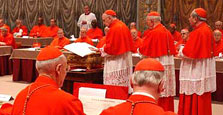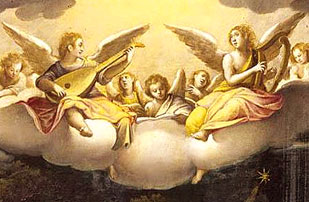
~ About Saints ~ by Deborah Beach Giordano
Who Are These Guys?
Many of us who were raised in the Protestant tradition have recited the Apostles' Creed, which concludes with the words, "I believe in the Holy Spirit; the holy catholic church; the communion of saints; the forgiveness of sins; the resurrection of the body; and the life everlasting." In the celebration of the Lord's Supper we proclaim our communion with "all the saints, living and dead.” Despite those familiar references, in general we're just a bit uncomfortable with this term: who are these guys and why are they important?
 For a Roman Catholic the answer is clear: this is a celebration of those who have been canonized. This is a lengthy official process established by the Church of Rome to determine that a person is a genuine saint. It requires a number of concrete, demonstrable post-mortem signs and miracles that can be directly attributed to the person’s heavenly intervention. Frankly, I find that troublesome. Maybe that’s why I’m a Protestant.
For a Roman Catholic the answer is clear: this is a celebration of those who have been canonized. This is a lengthy official process established by the Church of Rome to determine that a person is a genuine saint. It requires a number of concrete, demonstrable post-mortem signs and miracles that can be directly attributed to the person’s heavenly intervention. Frankly, I find that troublesome. Maybe that’s why I’m a Protestant.
Real Saints
Here’s the thing: although we don’t know for certain what heaven is like, there have been reports. At the very least it is a place of peace: a tranquil and restful “land beyond.” More elaborate descriptions tell us that in the Presence of our God there is pure delight, perfect peace, and radiant joy.
"[The Lord] will wipe every tear from their eyes. Death will be no more; mourning and crying and pain will be no more, for the first things have passed away." Revelation 21:4

In other words, it’s not hard to be in heaven. Once you get there life is good. It is an easy place to live — not complicated and challenging like it is here. So (without any disrespect to the “official” saints) it seems to me as if sending forth celestial blessings — while a great thing — is less of a big deal than it is to be “saintly” on the earthly plane.
While working miracles from heaven may indeed be a complex activity, it doesn’t help to orient me toward a more Christlike life. The tough stuff is living the way our Lord did in the midst of our difficulties; in showing forth love, faith, and integrity while facing our weaknesses and troubles and temptations.
That’s What I’m Talking About!
Those who are “saints” in the Orthodox Christian tradition do not have to perform miracles after their deaths — although such mighty deeds are often attributed to them. Instead these folks are called “Wonder Workers,” based on the words, deeds, and faith of their earthly lives.
Some of their saints did seemingly crazy things: going barefoot in freezing weather, taking the teachings of Jesus so to heart that they would literally give the poor the coats off their backs and the food from their tables, preaching in the middle of empty fields... They also built hospitals and established orphanages, educated poor children, established food banks, and prayed for days at a time for sick and the dying.
 For me that’s real sainthood: not postmortem “miracles,” but the “worked miracles” of true Christian witness. It is the showing forth of the Gospel in real-time: kindness, compassion, generosity and ridiculous optimism — in the midst of hatred, fear, poverty, and dire hopelessness.
For me that’s real sainthood: not postmortem “miracles,” but the “worked miracles” of true Christian witness. It is the showing forth of the Gospel in real-time: kindness, compassion, generosity and ridiculous optimism — in the midst of hatred, fear, poverty, and dire hopelessness.
Wonder Workers are courageous: doing what needs to be done, sometimes in ways that have never been done before. They speak out against injustice, work for peace and healing within their communities; they care for the ill, the weak, the suffering, and the lost. They do not concern themselves with fame, fortune, or public opinion; but are always about “their Master’s work.”
Wonderful Work
The wonder-worker saints are people just like us who were alive with a radiant hope and irrepressible enthusiasm for the Gospel. Their lives were marked with a sense of practical spirituality: they prayed and they worked. And, above all, they loved. Everybody. Unconditionally
That’s wonderful.
It’s also darned hard to do. Yet, through their words and works, these folks showed that it can be done. By people just like us. In times just as challenging as ours.
By their example, these saints inspire us. In seeing their works, in hearing of their lives we dare to hope and believe that we, too, can to live with as much wonder-ful courage, passion, and faithful witness to Christ.
Those are the kind of saints we ought to celebrate every day!
Virtual hugs and real-time blessings,
Deborah +
Suggested Spiritual Exercise
Who are the “saints” who have inspired you? Give thanks to the Beloved for the gift of their faithful ministry.
Give prayerful consideration to the way(s) in which you can be a “wonder worker,” showing forth the truth of the Good News of Jesus Christ in your daily life.